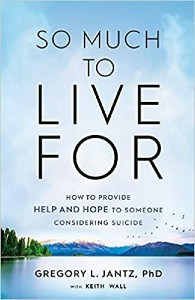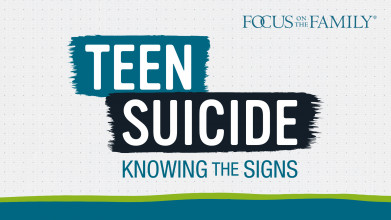Preview:
Dr. Gregory Jantz: It is worth staying in the game. You may not feel it today, you may not feel it tomorrow, but there are answers, so stay in the game.
End of Preview
John Fuller: That’s Dr. Gregory Jantz and he joins us today on Focus on the Family to address a difficult but important topic. I do hope you’ll stay with us as we discuss rising suicide rates and how you might be able to help a friend who feels hopeless. Your host is Focus President and author Jim Daly, and I’m John Fuller.
Jim Daly: John, the stats on depression and suicide in the United States are deeply concerning and should be to the church, too. Um, according to the CDC, suicide rates increased almost 35% uh, over the last 20 years.
John: Hm.
Jim: That’s high.
John: Astounding.
Jim: And one person dies by suicide in our country every 11 minutes. And I know some are saying, “Why would you cover this topic?” Because we need to. I think as the Christian community we should.
Dr. Jantz: Yep.
Jim: Be able to step into this gap and give spiritual, emotional, and physical reasons for why it exists and what are the ways for someone to find their way through this. Um, it’s difficult. Uh, even though this problem is pervasive, I think the point is, the stigma of depression has really stuck around. I don’t think we’ve dealt with how to help people, so they carry that guilt and shame. And oftentimes in the pews, suffer silently.
John: Mm-hmm.
Jim: ‘Cause they don’t wanna talk about it. Uh, depression is a complex web, and it can affect anyone at any time, young or old, humble, successful. It doesn’t matter. Today we wanna equip you to notice and step in when a friend or family member is sinking into despair.
John: Yeah, and if you know someone struggling, a loved one or a friend, a really good starting place is our website. At focusonthefamily.com/broadcast. Uh, you’ll learn more about resources like Alive to Thrive, our free online curriculum to help you with teens who might be battling suicidal thoughts. Additionally, we have caring counselors here and we’d be happy to connect you with one of them. It’s a free service provided by our donor community and uh, the number is 800, the letter A, and the word FAMILY. And as I mentioned, our guest today is Dr. Gregory Jantz, a mental health counselor and bestselling author. He has written a number of books and one of those will form the foundation for our conversation today. It’s called So Much to Live For: How to Provide Help and Hope to Someone Considering Suicide.
Jim: Greg, welcome back.
Dr. Jantz: So good to see you both.
Jim: Yeah.
Dr. Jantz: Thank you, Jim.
Jim: You fell into the right profession. You just bring light into a room when you’re in it. And uh, what a great thing to be that counselor.
Dr. Jantz: Wow. Thank you.
Jim: And God called you to a wonderful profession.
Dr. Jantz: You know what, as I’ve gotten older, I feel more passionate, too.
Jim: Wow.
Dr. Jantz: I’m really… at this point, when we look about suicide rates and what’s happening in the mental health area of our country, I’m all about saving lives.
John: Mm.
Jim: You know, let’s start with the dimension. Some people don’t live in this space. They don’t understand the contours of depression and suicide.
Dr. Jantz: Right.
Jim: I’m shocked that the second leading, uh, cause of death among 10–34-year old’s, the second leading cause of death is suicide.
John: Mm-hmm.
Dr. Jantz: It’s hard to even, when we use the word suicide it’s an awkward word just to use.
Jim: Yeah.
Dr. Jantz: I have to tell ya, this book was never on my radar. I’ve written 40 books. To think about doing a book on suicide was nothing I ever thought I would do. And then I started to look at what is going on here, and I believe we need to address this.
Jim: Yeah.
Dr. Jantz: And if you zero those stats in even deeper, your 12–17-year old’s are some of our most vulnerable right now.
Jim: That’s so sad.
Dr. Jantz: And it is the second leading cause of death nationwide for that age group.
Jim: So let’s, uh, dig into that at bit. Um, just looking at the landscape.
Dr. Jantz: Mm-hmm.
Jim: Why is this on the rise? Why over the last 20 years, that stat I gave, why are we seeing more depression? More suicide?
Dr. Jantz: Three things we’re seeing more of right now. In the last 2-1/2 years, coming through a pandemic, coming through all the time we’ve been g-, going through (laughs) and, uh, we’re seeing, uh, increase in depression, an increase in anything related to anxiety and anxiety disorders. And thirdly, addiction. Addiction rates have never been higher. When I say addiction, that includes, uh, alcohol. Alcohol sales are meeting all-time records. Isn’t that just a crazy thing to even say?
Jim: Yeah.
Dr. Jantz: Uh, prescription drug misuse and addiction. I think we need to talk about digital addiction.
Jim: Sure.
Dr. Jantz: Pornography. So any form of addiction has skyrocketed as well. So, all-time highs of anxiety, all-time highs of depression, and now addiction, followed now, the aftermath of that is increase in suicide rates.
Jim: Yeah. You know when you look again at the big picture, Greg, um, a country that has so much.
Dr. Jantz: Sure.
Jim: And of course, in Canada, I would consider them our cousins.
Dr. Jantz: Yes.
Jim: They, too, like the Western culture.
Dr. Jantz: Right.
Jim: I mean, there’s just been so much blessing in so many ways. Why when we have so much that our daily needs generally are met. I realize that some struggle in that space.
Dr. Jantz: Sure.
Jim: But generally, people can eat. People have shelter. And in that environment where it’s positive in meeting those basic needs, we have these emotional, uh, traumas.
Dr. Jantz: Right. And trauma is a good word for it, Jim. Here’s what we know. Right now, uh, psychologists are using a new term called foreshortened future.
John: Hm.
Dr. Jantz: So that means that our generation right now tend not to have hope for their futures. A foreshortened future. So there’s apathies at an all-time high, and the attitude is what does it matter? And then we mix in everything that our younger generation is going through in social media, uh, cyber bullying, everything that’s wrapped into social media. We have a generation that has no hope for their future. That’s the feeling.
Jim: Yeah. That’s the bottom line. And, you know, again, I saw a loneliness index that they’ve been keeping now I guess for 20 years or so.
Dr. Jantz: Yes.
Jim: So you would think in a culture, again, that’s so well connected, seemingly, loneliness is at a record high. Again, you’re connected digitally but you’re not truly connected in the way we were made by God.
Dr. Jantz: Jim, you’re right on. The more time you spend online and thinking you have connections, actually the higher your loneliness score is.
Jim: Yeah.
John: Hmm.
Dr. Jantz: So you’re really not connected.
Jim: Yeah. Professional help, obviously, is a good thing, and we try here at Focus on the Family to stress that.
Dr. Jantz: Yes.
Jim: For the Christian community, especially, because some hold back thinking, you know, God will take care of this.
Dr. Jantz: Right.
Jim: And that can be true, and that’s a wonderful thing. But sometimes it takes a friend or family member to step in the gap as well. Um, speak to the role a friend and family member can play with a person with depression or suicide ideation.
Dr. Jantz: Exactly. You know, one of the things that we tend to get afraid of is even using that word suicide, or even using the word depression. And I just wanna acknowledge, if you’ve been family member of you’ve had a loved one or it’s in your circle of friends, somebody has taken their life, that has such a huge ripple effect. There’s a grief that’s, uh, difficult to even explain that you go through.
Jim: Right.
Dr. Jantz: Uh, when you have a loved one. And so to deal with somebody who you think is contemplating suicide, it is a very difficult place to be. So I just wanna acknowledge the awkwardness of that, and to even have a conversation. And if you live with somebody, you could feel real exhausted yourself.
Jim: Mm-hmm.
Dr. Jantz: It’s like I feel like I’ve tried to do everything to help them, they’re not getting better, what do I do? And you feel helpless.
Jim: Yeah.
Dr. Jantz: And so that’s, just acknowledging family members can be in a real difficult place.
Jim: Yeah.
Dr. Jantz: Here’s what you need to do. Here’s some things to always keep in mind. Stay in relationship. Stay in relationship with that person. Uh, don’t be afraid to bring up the topics. Tell me. Here’s a question you can ask. Please tell me. I love you; I care so much about you. Will you tell me more about how bad is the struggle? Have ’em talk to you.
Jim: Yeah.
Dr. Jantz: Uh, one of the things that people who are struggling is they, they may not know what to say, but they need to talk about it. So keep an open door. Don’t give up on the relationship. Hold back from giving those simple answers (laughs) you know, like, why don’t you just shake, shake this off. Or we, we wanna fix it for them. Uh, though we need to pray for wisdom. K? Lord, God, give me the words what to say. Uh, but stay in the game with ’em.
Jim: Yeah. No, that’s really good. I, I’m thinking, Greg, how often, uh, we in the Christian community, again, you know, if we break our arm, we go to the orthopedist. Right? They set it. Um, I did that with Trent. He (laughs) was roller skating.
Dr. Jantz: Yes.
Jim: He broke it. And, uh, you know, and other ailments like that. If we’re prone to diabetes, we take medication. We pray, we ask God to take that away, or whatever the illness might be.
Dr. Jantz: Mm-hmm.
Jim: It seems easier for us to attack that when it’s physical.
Dr. Jantz: Right. Mm-hmm.
Jim: It seems more difficult for us as Christians, again, to attack it in the emotional space. And let me set the question up this way. Uh, Christians that I’ve talked to that feel like if they’re depressed or they’re feeling suicidal, they feel guilty about that. If God loved me, you know, why wouldn’t he take this away from me? This is the most horrible feeling a person could feel.
Dr. Jantz: Yes.
Jim: So why, how can they co-exist, that I’m a Christian and I feel depressed?
Dr. Jantz: We need to remember that the fear and the despondency, and just that sense of despair, when you enter into despair, you’re no longer thinking rationally. You, you will feel unlovable, like God doesn’t love me, my life doesn’t matter. And my life doesn’t matter to those around me. And so those suicidal thoughts start to lie to you. It’s a lie from the enemy and it starts to say things to you that are not true. So we need to remember that. Despair brings distorted thinking.
Jim: Hm.
Dr. Jantz: And so that’s where we don’t make good decisions. Um, so if you’re filled with suicidal thoughts or anxiety, you’re either frozen. You can’t, I can’t make a decision. Or you’re really impulsive. Uh, neither is good.
Jim: Right, right. And that’s why you need to recognize those signs. Um, address the common misconception that suicide is always linked to mental illness.
Dr. Jantz: Yes. And actually, um, when we use the term mental illness, it means a lot of different things. So when we think of mental illness, sometimes even the word like psychosis or a person that may have a serious mental disorder, uh, we know that that doesn’t represent most of the suicides, surprisingly.
Jim: Huh.
Dr. Jantz: So, um, what we do know is, it’s a person that’s maybe had a lot of trauma. There’s been despair. There could be significant grief. They’re afraid of a future crisis in their life, and they see no way out. Remember, despair feels like I have no way out.
Jim: Yeah.
Dr. Jantz: So that’s more common than having quote, a mental illness.
Jim: You know, it’s interesting with scripture where the Lord says, you know, fear not.
Dr. Jantz: Yes.
Jim: I didn’t give you a spirit of fear. There’s so much power in that, but, you know, again, to a person that’s experiencing that anxiety or that fear…
Dr. Jantz: Right.
Jim: I could only imagine it feels like they’re trying to build a bridge and they don’t have the lumber or the brick to put in the bridge.
Dr. Jantz: Yeah.
Jim: How do they address?
Dr. Jantz: Yes.
Jim: Where, where do they go find the ability to create that mental bridge?
Dr. Jantz: Where here’s a promise we have. I think of II Timothy 1:7 that says, The Lord hasn’t given us a spirit… as you just said, Jim, uh, a spirit of fear. So that tells us fear, there’s a spirit of fear, uh, but of power, good, love, and a key word here, sound mind.
Jim: Hm.
Dr. Jantz: How do I re-establish, what’s the building blocks for a sound mind? Well, one of ’em, I can’t live in isolation. I cannot do this alone. Uh, when I’m overwhelmed I wanna isolate. I tend not to make good decisions in isolation, um, so I need to move away from isolation, and if you’re living with somebody and this is what they’re struggling with, um, you need to talk to them. One of the myths, and you, you led this so nicely, but one of the myths is, if I say anything about suicide or ever use that word, I’ll give them ideas. That is clearly a myth.
John: Hm.
Dr. Jantz: You may wanna open the, the door of communication and say, “Have you ever thought about taking your life?” And I know that’s a big question, but so open up that door.
Jim: Huh.
Dr. Jantz: They need to talk about it.
Jim: Yeah.
Dr. Jantz: Now, if they say yes, and they say, “Yeah, I, I, and I have a plan.” Okay, we need to talk about what to do then. But don’t be afraid of asking that question. That could be opening the door of hope.
Jim: Yeah. Uh, eh, while we’re here at this point, I think it’s important for you to identify those stages of that downward spiral.
Dr. Jantz: Sure.
Jim: What are they?
Dr. Jantz: Well, a stage of a downward spiral would be I isolate, I withdraw, I move away from others. I may, uh, start to put even things in my life in order. Times you may be living with a person who’s been severely depressed, but then it seems like all of a sudden, they’re like doing better, and it seems like there’s a sense of relief. Sometimes that’s an indication that, uh, they start giving away things, they start putting some, quote, putting their life in order because they made a decision to take their life.
Jim: Huh.
Dr. Jantz: And then when they do that, we look back and go, “What did I miss?” And so if you’ve ever been involved in this, you can do a lot of self-blame. You can look back and go, “What did I miss?” And then we get into this, “I should’ve known more.”
Jim: Oh yeah.
Dr. Jantz: Uh, and we can blame ourselves. I can tell you, once a person has made that decision, that’s their, it’s a decision they’ve made, unfortunately.
Jim: Yeah.
Dr. Jantz: And you think about our words, the matter of life and death, and we can speak life over a person, and we need to do that, but what they have decided, they decided.
Jim: Yeah. It, it, it’s, uh, you know, if a family hasn’t gone through that…
Dr. Jantz: Yes.
Jim: we’ve talked about Jean’s brother who committed suicide on the broadcast so I’m not sharing anything that I shouldn’t, but that was one of the residual effects, I mean, the way the family beat themselves up for not preventing it. And that can be a heavy weight of guilt for the family members.
Dr. Jantz: Oh, yes.
Jim: If something happens.
Dr. Jantz: I wanna caution against the self-blame, but you can, ’cause you’re grieving, and you go what, what did I miss? What should I have done differently? And you can be in that, just keep cycling that over and over and you can create a lot of depression for yourself. Um, so we need to be really set free of that self-blame.
John: Yeah. And this is Focus on the Family with Jim Daly and, uh, our guest today is Dr. Gregory Jantz. Obviously a very heavy, sensitive topic, but we trust you’ll give us a call if we can be of any help to you along the way. Uh, if you’re dealing with struggles or you have a loved one who is in a tough place, like Dr. Jantz has been describing, our number is 800, the letter A, and the word FAMILY. Or stop by focusonthefamily.com/broadcast. And while you’re there, be sure to look for Greg’s book So Much to Live For: How to Provide Help and Hope to Someone Considering Suicide.
Jim: You, you describe a woman named Sheila in your book, uh, So Much to Live For, which again, what a great, positive title.
Dr. Jantz: Mm-hmm.
Jim: But, um, it kind of fits this description. Uh, describe what Sheila went through.
Dr. Jantz: Well, Sheila’s situation was she had been depressed for a very long time, but then we saw a suddenly, relatively sudden change in mood, which means it looked like she was getting better, and then we kind of stopped being so concerned.
Jim: Ah.
Dr. Jantz: And she was one that, in this case, had begun to make a plan. So my point is, don’t be afraid to keep asking the questions. Now, it’s not the only question we ask.
Jim: Right.
Dr. Jantz: Um, but, um, stay in relationship. See where they need to have help. Uh, we want to be an instrument of help but we’re not the one to solve everything.
Jim: Right. Um, let me turn to the risky behavior side of this, too.
Dr. Jantz: Sure.
Jim: ‘Cause I, and I would suggest, and you can correct me, but I would think this is seen in boys and men where if they lean in this direction all of a sudden, they can start, I mean, just crazy stuff, mountain climbing, rope climbing without tethers.
Dr. Jantz: Mm-hmm.
Jim: Um, and again, I’ve seen some of that in our own family where those people that are losing that will to live decide, okay, I’m just gonna, you know, risk it all, and can do that in more recreational ways, driving too fast, you know, in a sports car.
Dr. Jantz: Mm-hmm. Yes. So sometimes when they’ve made a decision to kind of tease the idea and they start to increase risky behavior.
Jim: Right.
Dr. Jantz: It can be any form of risky behavior. Um, I’ve seen people, they’ll start walking across a busy street, you know, in front of cars.
Jim: Like baiting fate.
Dr. Jantz: Yeah, so they’re testing the notion. There are those who will get so close to doing something very drastic, they’re testing the notion. Now, the warning is, the more often I do that, at one point I will make the decision.
Jim: Mm-hmm. One of the difficulties, and we’re kind of dancing around it a little bit, it, you know, you, this is such a hard topic, and it’s hard to be direct, and to really ask those questions. My problem would be, you know, every morning, hey, how are you doing?
Dr. Jantz: Mm-hmm.
Jim: What’s going on emotionally.
Dr. Jantz: Right.
Jim: Give me a scale of one to 10. That can be a bit of a drag, too, if I’m listening to myself, but that question was pointed to me, “Man, Dad, you gotta start every conversation like that?”
Dr. Jantz: Yeah.
Jim: So how do you manage all that?
Dr. Jantz: That’s why we, sure, and that’s why we never wanna do it alone. We always wanna engage others in the process. So that’s where the professional help, that’s where we have other loved ones.
Jim: Yeah.
Dr. Jantz: That’s where we have a team of three to five people who are our inner circle. They’re praying. We’re seeking wisdom. But but it can’t land only on one person. Now if you’re a loved one and you’re living with a loved one in this struggle, I understand. There’s a caregiver fatigue here. You’re waking up with anxiety ’cause you don’t know how are they gonna be today.
Jim: Right.
Dr. Jantz: And so, that’s a tough one to walk. When I say stay in relationship, it doesn’t always mean I’m asking the same question every day, um, but I am really learning to trust myself, trust that God-given intuition, that if something seems amiss, I say trust yourself.
Jim: Hm. Yeah, that’s good.
Dr. Jantz: Yeah. And it may be, “Do you have an appointment today? Or what’s on your schedule for today?” Always look to the future. If they say, “Yeah, I have an appointment at 5 o’clock today and I plan on being there.” Okay, that’s a good sign.
Jim: Yeah.
Dr. Jantz: But always look to the future.
Jim: No that, that is really good. (laughs)
Dr. Jantz: Yeah.
Jim: The, uh, the idea of being direct, though, how do you, how, you know, that again can be a little delicate balance. So if you’re noticing those things, how do you encourage the loved ones to be as direct as possible?
Dr. Jantz: Well, I always preface it with a statement of affirmation, and it may look like, “I love you so much, I so care about our relationship. Is it all right if I ask you a couple questions today?”
Jim: Yeah.
Dr. Jantz: So you’re affirming them, and then you’re getting permission to ask a couple questions. And you’re gonna say, “Really, tell me how you’re really doing. I know there’s been a big struggle, but let me know, how are you really doing?” They may have a hard time putting it into words. If it’s a teenager, you know, their famous word is, “I’m fine.” (laughs)
Jim: Yeah, about everything.
Dr. Jantz: (laughs) I’m fine. I’m fine.
Jim: Yeah.
Dr. Jantz: Don’t you know? I’m fine.
Jim: Yeah.
Dr. Jantz: But you stay in relationship with them. And sometimes if it’s a teenager, take ’em out for a walk. Have a conversation. Create some physical movement while you’re engaging with that teenager.
Jim: The other delicate point in this relationship, let’s say you do notice some things.
Dr. Jantz: Yeah.
Jim: You are concerned about it. You’re doing everything you can to stay in tune, I think that’s a pretty good word, so you’re not overbearing with it.
Dr. Jantz: Yes.
Jim: You’re just in tune, and then you begin to think, okay, some professional help, a Christian counselor.
Dr. Jantz: Mm-hmm.
Jim: Pastor. It would be good for this loved one, or this friend to encourage them to talk with that person. That can be a really delicate discussion. How would you suggest a person, uh, do that?
Dr. Jantz: “Can I come along side you and find somebody that I believe could be of real help right now?” And so we’re gonna ask permission, and then you’re gonna kind of say, “You know, I’m gonna work on this with you but we’re gonna find somebody.” Uh, and you know, it may be you’re takin’ ’em to the first appointment, uh, and maybe it is somebody in ministry. Maybe it is a pastor, but we’re going to begin to build a support group of three to five people.
John: Hm.
Dr. Jantz: Now, one of the things we haven’t mentioned yet, it could be really important that we look at, is there some significant trauma? Are there medical issues? Uh, a person who’s been given a tough diagnosis, for example, they may, uh, be at a place where they need, uh, to really deal with that medical diagnosis. You know, just that word cancer can be really scary, and people start to think, okay, is it worth living?
Jim: Yeah.
Dr. Jantz: And so that’s a ra-, the irrational thinking.
Jim: Greg, I, I wanna make sure we pepper this with God.
Dr. Jantz: Yes.
Jim: That’s so important. I mean, God creates us, we believe in him, we accept his son Jesus as our Lord and Savior. This battle that can be there when you’re struggling in that spot. Lord, take this away. Lord, help me.
Dr. Jantz: Mm-hmm.
Jim: Um, again we asked that early on about the guilt that comes with that, but wha-, how does God view that and what are the characters maybe even in scripture? David seems to be somebody, King David, who struggled with depression at times. The Psalms seem to suggest that.
Dr. Jantz: Yes, but he…
Jim: So when you…
Dr. Jantz: Sometimes he seemed like he was up and down. (laughs)
Jim: Yeah, a little bit, yeah, manic and all those things.
Dr. Jantz: Right.
Jim: But when you look at those characters in scripture, how do you see God dealing with them and their own self-awareness about what was going on, even though they didn’t have the diagnostic tools that we have today?
Dr. Jantz: Right. Well, two words come to my mind. One, preserve. God preserved them. And then there’s the word prevail, that we’re gonna have victory. And you need to remember, when we’re dealing with mental health issues, there is Lord Jesus, preserve the life, and preserve the life and you have a plan for this life and it’s a good plan. And then prevail. Prevail means I’m gonna win over the opposing forces. And so that’s, I’m gonna have victory here. And you need to be speaking victory into that person’s life. Pray Lord, God, give us the wisdom to know what is it they need? What’s being missed? A lot of times a person who has struggled with lifelong depression or anxiety, there’s been a couple missing pieces to the puzzle.
Dr. Jantz: And, and, so Lord, show us what needs to be addressed here. And so I do see it. I see it like one big puzzle, we’re gonna keep putting the pieces in there, and God’s gonna help direct that.
Jim: Hm.
John: Hm. I, I’m thinking, Greg, as your speaking of that story in scripture of the four friends who let their, uh, friend down through the roof in front of Jesus.
Dr. Jantz: Yes.
Jim: Yes.
John: They were kind of doing what you were talking about. They were having hope for the future. They were having faith on his behalf, perhaps.
Dr. Jantz: Mm-hmm.
John: Uh, to bring him to the Master…
Dr. Jantz: I love that.
John: for healing. So really what I hear you saying is we can do this for somebody who is struggling, even if it’s uncomfortable for us, even if we don’t have a license, you know, we, we’re not counselors.
Dr. Jantz: That’s right.
John: We can be part of that circle of friends that will help this person come a little closer to Jesus and have some hope for the future.
Dr. Jantz: I can tell you this, and that’s exactly right. You will not regret living, you may not see the option right now, but we have worked with so many folks through the years who lived with a lifelong pattern of suicide attempts and suicide ideation, and they have been set free from it, and they will tell you, “Life is worth living. I am so glad I’m alive.”
Jim: Hm.
Dr. Jantz: And so, it is worth staying in the game. You may not feel it today, you may not feel it tomorrow, but there are answers, so stay in the game.
John: Hm.
Jim: Yeah, I think, you know, one of the phrases Jean often uses now when she’s helping friends, you know, jump in and make sure they’re diligent about looking at those around them.
Dr. Jantz: Yeah. Yeah.
Jim: And make sure they’re healthy, but she’ll say, you know, suicide ends up being a permanent solution to a temporary problem.
Dr. Jantz: And that’s really the truth.
Jim: Wow.
Dr. Jantz: Yeah.
Jim: I mean, that’s powerfully stated.
Dr. Jantz: Yeah.
Jim: And I think, you know, dips are gonna occur, emotional dips will occur, but that’s why we’re doing’ the program today. Uh, Greg, I, uh, the caregiver, what do you recommend for them to stay emotionally healthy, robust? What are the care factors for them to consider as they’re caring?
Dr. Jantz: Yes, very important. Sometimes a caregiver, Jim, forgets to take care of themselves.
Jim: Right.
Dr. Jantz: So everything from sleep to food and your own self-care. You’ve got to take care of yourself. It’s kind of like putting the oxygen mask on you first.
Jim: Right. (laughs)
Dr. Jantz: So but keep up the self-care. And that means also keeping your mind and spirit renewed. Take those promises from the scripture, a favorite verse or two, put them on the old fashioned 3 x 5 card and I want you to carry those around. (laughs)
Jim: Yeah.
Dr. Jantz: Pull ’em out occasionally. Speak God’s word out loud of truth, but you’ve gotta keep yourself renewed.
Jim: Yeah, that is good. Renewing your own soul by…
Dr. Jantz: Yes.
Jim: you know, reading the word. That’s so good.
Dr. Jantz: Mm-hmm.
Jim: Uh, Greg, let’s end with this question. It’s probably the most critical. Wha-, what encouragement would you offer those listening who are worried about a loved one?
Dr. Jantz: Yeah, and I understand the worry. Let’s acknowledge the very difficult place that you’re at. One advice is, uh, let’s not do it alone. It may be picking up a phone and, uh, making a phone call today, taking some kind of action, but let’s not do this alone. The other is pray for wisdom, that God will show you what does this loved one need? Because we wanna help supply the help meet those needs. And be patient. Be patient with yourself. God can be at work, the Holy Spirit is at work, a plan could be evolving and we’re not fully aware of it, so, but you are a part of the solution. Stay in the game.
Jim: Yeah, that is good. Hey, Greg, thank you for offering such great, uh, help and insight for people who are in a dark place, or people who are noticing others in that dark place, and let me turn to the listener, the viewer. Yeah, if that’s you, get a hold of us. I mean, everything is free. We’re doing this out of Christian compassion, and you get in touch with us, we can help you, we can connect you with a Christian counselor. We have a referral system that we can, uh, refer you to, uh, to a counselor in your area who can pick up that relationship. And we have a tremendous number of resources including Greg’s book, So Much to Live For, that we want to get into your hands. If you can join us in the ministry and be part of the ministry, we’ll send it to ya, uh, as our way of saying thank you for a gift of any amount, but we don’t want that to be the issue. Uh, if you need it, we’ll send it to ya. Just call us and ask for it, and we’ll get it into your hands trusting others will take care of the cost.
John: We’re a phone call away. The number is 800, the letter A, and the word FAMILY. Or stop by focusonthefamily.com/broadcast. And as Jim mentioned, we do have, uh, some tremendous caring Christian counselors here. We’d be happy to take your number, give you a call back, uh, at a time that works for you and make sure that, uh, you have that, uh, that conversation with them. Also, as I mentioned earlier, Alive to Thrive is our free online curriculum for parents and youth leaders working with teens. It’ll give you some great tools, and again, you’ll find that at focusonthefamily.com/broadcast.
Jim: Greg, again, thank you for being with us. This has been really helpful, although difficult. Thank you.
Dr. Jantz: It is difficult, and there is so much to live for. I, I’m passionate about saving lives.
Jim: I know that.
Dr. Jantz: Yeah.
Jim: Thank you.
John: And on behalf of Jim Daly and the entire team here, thanks for joining us today for Focus on the Family. I’m John Fuller inviting you back as we once again help you and your family thrive in Christ.



















